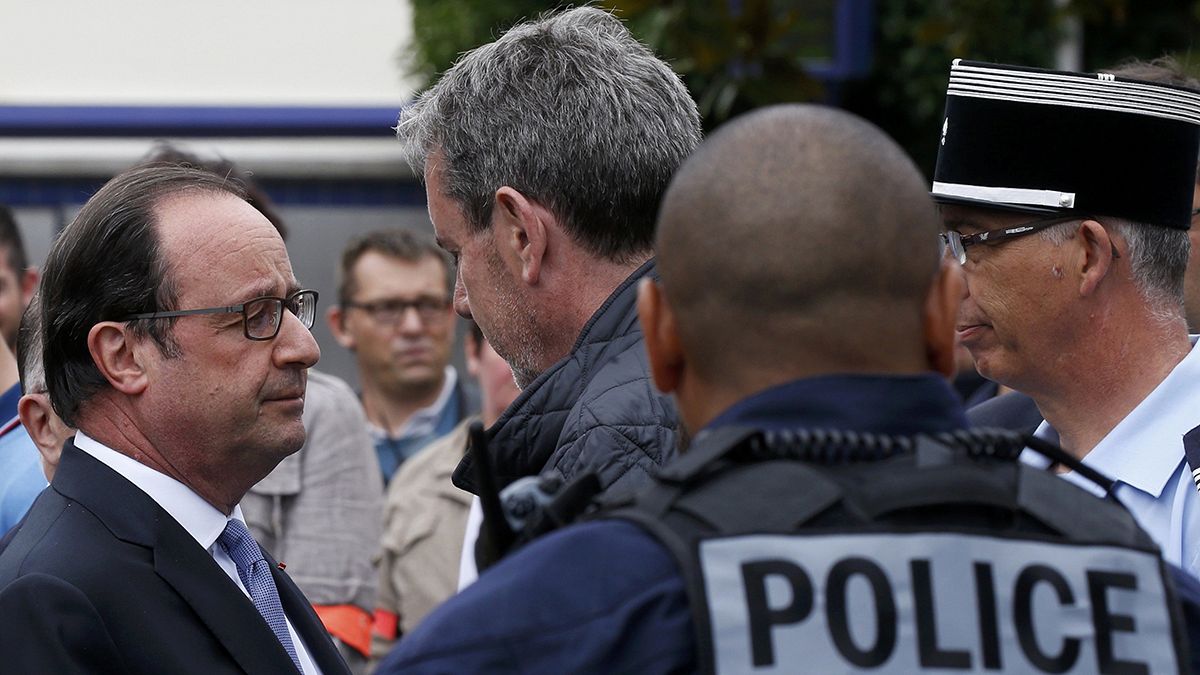The wave of attacks in France is not only ramping up pressure on Francois Hollande’s government over security – it’s also putting inter-faith unity in the…
The wave of attacks in France is not only ramping up pressure on Francois Hollande’s government over security – it’s also putting inter-faith unity in the spotlight.
Speaking to Euronews, the state representative for France’s Rhone-Alpes region has appealed for the country not to get pulled into the politics of the enemy, who he says want to pull the country apart.
“I appeal once more for the spirit of harmony and brotherhood because the enemies of the Republic, the enemies of our values, the enemies of our freedom, dream only of one thing – that is that France fragments, as hostility grows between groups, between communities and it’s especially against what must also be the spirit of harmony, brotherhood and great determination in implementing the rule of law,” said Michel Delpuech, Rhône-Alpes state representative.
He continued: “It’s not the state that’s in danger because the strength of the State is the rule of law, the force of law. What is threatened is our living together in the Republic.
“We must be extremely careful and vigilant and do everything possible to defend the Republic, preach cohesion and especially avoid communitarianism, against all cultural entrenchment.
“The Republic and its values have unfortunately been threatened by attacks for too long now.”
When asked whether France could move to a higher state of emergency and what it will mean for places of worship, Delpuech responded: “State of emergency laws specifically make provision to close places of worship, if there are issues. In the previous emergency, that’s what we did.
“Here in Lyon, I closed a so-called Mosque in this context, I believe you remember that.”
He continued: “It is especially important that we know who is preaching at the mosques. And it was my call to Muslim leaders to act with a sense of responsibility. I do trust them. But we need to know who holds the sermons? Who fills the role of imam, what is happening?
“The Muslim community must help us to promote and defend Republican values, I extend my hand to them and I trust them. That’s where the future lies.”
Opportunistic lone wolf
The so-called Islamic State militant group has prioritised targeting France. It has been bombing ISIL’s bases in Iraq and Syria as part of a US-led international coalition.
To understand the phenomenon behind this wave of attacks, Euronews journalist Sophie Desjardin spoke to Hasni Abidi, director of the Study and Research Centre for the Arab and Mediterranean World in Geneva.
He described a “paradigm shift” and a change in ISIL’s doctrine that could be seen as a turning point in their existence.
“Today in the spotlight you have these so-called lone wolfs, but they are not that lone: they carry out these attacks wherever they are and whenever they can. It’s a strategy of political opportunism, where they take advantage of any security loopholes to launch their attacks,” Abidi explained.
“At the same time, this strategy shows us that ISIL is being weakened, thanks to the coalition’s airstrikes, and it’s losing ground and losing influence in Syria and Iraq – that, in turn, fuels a desire to sow chaos, disorder and shock in the states or territories where they can effectively strike.”
Asked if these attacks could profoundly change societies in Europe, he said: “I hope not, because the aim of ISIL is of course the fear and shock caused by an attack, more so than the human toll, in order to change public opinion – ISIL absolutely wants the countries that are part of the coalition to give up and stop taking part in the air strikes. They also want to pit parts of the population against others: they know that our democratic societies are open, diverse – and also vulnerable.”
While Abidi stressed that those who commit attacks don’t represent the Muslim community nor Islam, he said “Muslims need to stop hiding and admit that yes, the attackers are members of the Muslim community.”
Jihadists also tend to have chaotic life stories – problems in their family, at school, in terms of integration – so there’s also more local responsibility, he said.
“We must not fall into the trap of a ‘religious war’ – this is not a war between religions. ISIL does not represent religion, terrorism has no religion. But there is a real risk of social friction, tensions within the population, because attacking a church or a priest equates to attacking a fundamental element of identity. And society must really start reflecting on ways to rein in this terror, on the right approach to resist the panic and chaos that ISIL wants to implant into our societies.”
